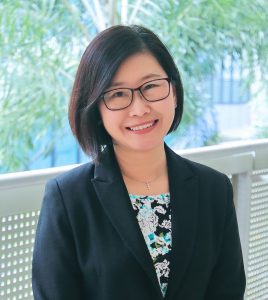Young Children’s Voices in Mathematical Problem Solving
Contributed by Dr Ho Siew Yin and Sng Wei Qin Abbie, from NTUC First Campus, for SingTeach Virtual […]
Read More
Traditionally, classroom teaching and learning have been dominated by pedagogies that are largely teacher-centred which often result in passive learning for students. In the past decade, however, the notion of education has shifted to one that greatly emphasizes the importance of student-centeredness. To reinforce the shift, St Hilda’s Primary School turned to an online platform that facilitates knowledge building inquiry called the Knowledge Forum. The school’s principal, Mrs Daphne Yeoh, shares some insights and the challenges that come with this new approach to teaching and learning.

In the past, students rely heavily on their teachers as their source of information and knowledge, and that is something Daphne hopes to move away from. It is important to her that every student has a hand in his/her own acquisition of knowledge. For her, this can be done by adopting knowledge building pedagogies that encourage active and collaborative learning in classrooms.
Originally backed by the school’s former principal, the implementation of knowledge building was a ground-up initiative by the Gifted Education Programme (GEP) department headed by Mr Andy Ng. In continuing her predecessor’s support for this initiative, Mrs Yeoh believes that KB’s principles bring about many benefits. This pedagogy was also aided by the use of an online information and communication technology (ICT) tool.
“We adopted the Knowledge Forum (KF) as a viable ICT tool to promote collaborative learning among students,” Daphne shares. “And as the teachers explored the use of KF and began to understand knowledge building better, they saw its intrinsic worth as a pedagogy that engages students in co-constructing knowledge.”
The KF also exposes teachers to various knowledge building principles that act as yardsticks for them to design, execute and evaluate their lessons better. Mrs Yeoh however cautions that: “A successful lesson is not one that covers all knowledge building principles, but instead translates one or a few into creating a learning ecology that supports the students’ co-construction of knowledge with their peers and their teacher.”
Now in its infancy stage in SHPS, knowledge building theories are situated as “pedagogical directions” in which the head of the GEP department weighs students’ needs, teacher readiness and the school’s direction to determine which approach is most appropriate for the year’s work plan. “This approach is then re-positioned to fit the school’s context and adopted by subject teams which translate them to projects that solve a specific problem in their classrooms during implementation.”
“Ideas and pedagogies that are successfully implemented in one department in the school are then shared and may be adopted by others, thus scaling up the practice in the school.”
– Daphne, on how the knowledge building practice has been scaled up at St Hilda’s
At St Hilda’s, teachers are encouraged to explore the use of new pedagogies, tools and platforms to facilitate, engage and enrich student learning. “Our school leadership encourages ground-up initiatives and teachers are given the autonomy to decide on the kind of approach to use in their classroom teaching.”
Teachers are also given the opportunities to participate in innovative projects, research as well as professional development opportunities, such as attending workshops and conferences on knowledge building. For example, as part of the Knowledge Building Network Learning (International) Conference in 2019 which was organized by the Office of Education Research at NIE, Daphne and her team of teachers engaged the conference participants in a variety of activities on knowledge building in her school. This includes classroom visits, workshops, poster sessions facilitated by students as well as a plenary discussion.
“Ideas and pedagogies that are successfully implemented in one department in the school are then shared and may be adopted by others, thus scaling up the practice in the school,” Daphne shares.
However, the successful implementation of knowledge building at St Hilda’s did not happen without its own challenges.
“As knowledge building is a principle-based learning approach, the difficulty lies in making the theories and principles palatable to teachers, who already have a lot on their plates,” Daphne says.
The fact that knowledge building also involves a radical rethink of what learning can be in this new “knowledge age” also contributes to the challenge of exciting teachers with this new approach. As such, Daphne feels that some individuals who are used to more conservative approaches to teaching – especially if they already have existing methods that work – may struggle to adapt.
So how can the knowledge building then be positioned in a way that addresses the needs of students and teachers in the classroom and aligns with the direction of the school and nation, all while retaining the essence of the theory? “Start small and use knowledge building to address existing challenges in teaching and learning, with future learning in mind. After all, the school envisions its students to be changemakers of tomorrow,” Daphne advises.
Action research naturally followed as part of teachers’ efforts to improve their skills. “This is one effective way in which teachers can hone their own craft, crystallize their learning, and share it to help others to hone theirs as well.”
Through the process of working on knowledge building research, St Hilda’s practitioners became more cognizant of the principles behind their pedagogy and are better able to close practice-theory gaps. Ultimately, this translates not only to quality professional development of self and others but also more importantly, an improved quality of learning for students.